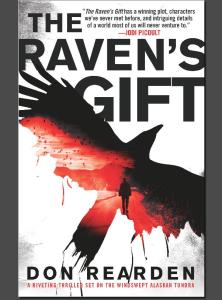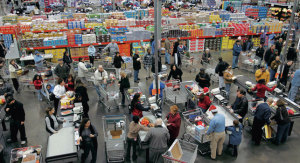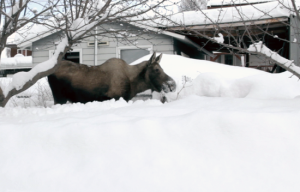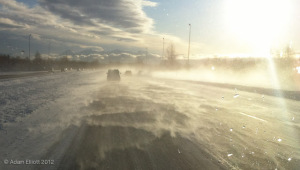What do we talk about when we talk about food? It’s my feeling that discussions about food always reveal at some level the most intimate, spiritual, and dearly held values with which we compose a life. I think, for instance, of the struggle that some families I encounter go through to make ends meet, and how many times we frame this basic challenge in terms like “putting food on the table,” or “keeping the kids fed.”
It’s hard for me to contemplate my relationship to food in Alaska nowadays without my thoughts swiftly veering to Don Rearden’s wonderfully eerie, post-apocalyptic novel, The Raven’s Gift. The book, which came out in 2011, takes place in an Alaska that could easily and believably prove five minutes or five or fifty years into the future. Set around the far-flung region of Bethel – a city (population approx. 6000) accessible only by air or river in Western Alaska – we encounter John Morgan, a man who with a large heart and pure intentions moved to the remote location with his wife, Anna. Both aspired, in overly relatable, starry-eyed ways, to experience first hand one of the lone, final wilderness frontiers on Earth. John and Anna find their way North and court adventure not by aiding to plunder the state’s wealth of natural resources, but by following opportunities to live and teach in the schools of a community comprised primarily of Native Americans.
But then things go horribly awry, descend – as the book’s jacket reads – “into total chaos.”
Rearden never goes far out of his way to specifically detail what happens that sends John’s life careening into the most unintended, terrifying and primitive form of survival imaginable. It’s not the “how” we got here that matters. It’s purely, “You’re here. Now what?” We hear rumor of a deadly epidemic. Did it spread through all of Alaska? Did it reach beyond Alaska and infect America? Or was it restricted only to Bethel? Was it an intentional epidemic? But does it even matter? When an unexpected stranger offers Morgan a cup of broth – after wandering how long without food in his belly – you don’t care about the origins of this tragedy. You’re sipping broth with him. When he risks a daydream about a cup of coffee, you’re shivering in your bones, too, and you want to offer him a simple cup of joe. The novel puts a man with minimal skills in the absolute barest of imaginable circumstances, strips him of everything he possesses and loves, and tells him only, “Survive this.”
The story offers a unique perspective – with a touch of Stephen King, and periodic nods towards The Road – regarding the curious dilemma that comes with trying to live out one’s dreams up here. Intentionally or no, it indirectly asks readers how they would survive in one of the rumored remaining “wild places” in the 21st century as it strives to become as domesticated and predictable as every strip-malled and fast-fooded location that many of us came here to escape. On one hand, in Alaska, we can hunt wild game and catch and wrestle with so many salmon in the summer that they will swim through your dreams. We can pick our weight in wild blueberries for free, and not pay the exorbitant prices for farmed blues that our friends and family pay Outside. (“Outside” is ow we refer to everywhere in the Lower 48.) And yet, despite this, it often strikes me that a low-level anxiety persists.
It’s noticeable when you hit Costco or Sam’s Club on the weekends. It’s in the way the crowds, myself included, flock in droves to the warehouse stores to purchase mountains of foods and goods that come shipped to us from Anywhere out of state. You can ask me about terrifying bear encounters all you want, but in Anchorage I’m more often worried about escaping the Costco parking lot in one piece than I am concerned with encountering wild animals on a hike in the woods.
The idea that “Alaska” largely proves synonymous with “survival(ist)” probably isn’t news to anyone. And, to the credit of more than a handful of true-to-life rugged individualists past and present, the state definitely boasts a fascinating library of stories revealing that many Alaskans live life a little closer to the bone than the majority of their fellow Americans. And while there’s not time or space to explore the topic here, we’ve also seen a rapidly growing demand for locally grown produce and goods, and are watching farmers markets gain traction at the local level in ways they wouldn’t have a decade ago.
But Don Rearden’s novel turns a blind eye to our romance with “Alaska” and challenges every naïve notion we carry about “wilderness.” And he does it in such a way that I consider his post-Apocalyptic Alaska tundra every time I walk into Costco and see crowds manically surviving, depending on mountainous flats of pre-packaged foodstuff and goods that rely on barges, flights, and massive amounts of fuel in order for us to consume it. I see John Morgan staggering across the naked tundra when I hear my coworkers or students giddily rave about the new Olive Garden or Chile’s coming to town as if we were a remote African village miraculously acquiring a fresh water resource. What is this nimble, unsustainable set design we’re blissfully constructing in Anchorage, and what does it say that while we’re welcoming it here, many communities Outside are beginning to reconsider and address the glaring errors and dangers that exist in this format?
The winter I first read The Raven’s Gift happened to be the snowiest winter on record in southern Alaska in nearly 60 years. This, compounded with the fact that I had become a single father only a couple months prior to that cold, record-breaking season caused the book to leave an indelible mark on my trembling, unnerved heart.
Sprawled along my couch those dark, lonesome and silent evenings, I would set the novel down and look past the frosted windows of my apartment, stare out at the four-foot high mounds of snow in the front yard and find in John Morgan’s plight a frightening metaphor for the stark terrain of my new life in Alaska. It was impossible not to feel stranded and terrified in those months, living as far away as I do from my entire extended family and closest friends, all while striving to make ends meet each week, to survive on a very middling-, single-income from my work at a non-profit social service agency. Never mind wanting to be “a good father” (or husband). What did/do those terms even mean? All I knew to want then was whatever would keep the boys healthy and fed.
What do we talk about when we talk about food? I believe discussions about food are at heart holding and asking the most valuable questions about our collective survival, on one hand, and that discussions about survival explore and reveal our most deeply cherished values and intimate connections to the places we find ourselves and to all the people we encounter there.
John Morgan encounters these truths in the most primitive way imaginable. I’ve been fortunate enough not to learn these lessons as brutally as he does, although his journey strikes me as eerily familiar, and never very far away from my own.




How far is Alaska from Tennessee? I don’t know, but this piece connected with me. In an odd sort of way, (and this may seem like a stretch to you), the South seems disconnected from the rest of the forty-nine states, almost like a different country, which we tried to become, but that is a whole other story of individual and collective survival.
Thank you for gracing this blog with beautifully written stories of truth. They are important to tell.
Wow, so much to chew on here, Jonathan (pun intended, of course). There’s something about the contrast you paint here that speaks to me of the larger themes: “[we can] wrestle with so many salmon in the summer that they will swim through your dreams. We can pick our weight in wild blueberries for free…” and “…many Alaskans live life a little closer to the bone than the majority of their fellow Americans.” There are different ways to think about what “having plenty” (or not) looks like, especially when we think about what it means, in our culture today, to talk about food.
So much to think about here, Jonathan.
When you first mentioned The Raven’s Gift, I immediately thought of Elijah and the raven who fed him during the famine in Israel. I wonder if there is any connection.
Alaska has always felt very remote to me, and I love this glimpse into a place I haven’t been.
Thank you for this.
Thank you, Cara. I don’t think I get this across here, but I often joke with friends that I wonder if I’ll ever really be able to acclimate or live anywhere else after 10 years up here. AK gets into your bones. It’s hard to describe. It’s more than just another state…Sometimes it feels like another planet, or maybe even just another country & after a decade, I see how being here is as natural – on one level – as the air I breathe…I appreciate your feedback, and thanks for reading. And great job on your piece, too!!! Glad you’re in the mix 🙂